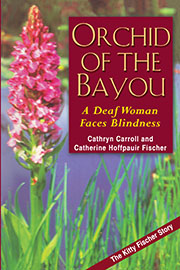A Deaf Woman Faces Blindness
The Kitty Fischer Story
Cathryn Carroll and
Catherine Hoffpauir Fischer
February 2001
|
View the table of contents. Read an excerpt. Read reviews: Publishers Weekly, DSQ, Silent News, Louisiana History. |
$29.95t print edition $29.95 e-book |
From Louisiana History
Cathryn Carroll and Catherine Hoffpauir (Kitty) Fischer provide a fascinating account of the challenges encountered in growing up in Acadiana in the 1950s and 1960s. The fact that Kitty Fischer was the only deaf person in her immediate family adds another dimension to the difficulties of her childhood. Additionally, she withstood family tragedy, including the death of her mother (and thirty-three years later,her little sister) from lung cancer. Her story is extraordinary: on the one hand for the hardship she endured at many different levels, including poverty and limited opportunities; on the other hand, for her ability to take it in stride. Although problems confronted her at almost every turn, she appears to have accepted them as inevitable, and her outlook is positive. On many levels, her life is an unforgettable testimony to resiliency.
In this book we learn a great deal about schools for deaf children. The history of the Louisiana School for the Deaf is particularly informative as is the description of life a Gallaudet. The debate of the “best” way to teach deaf children to communicate still continues, but when Kitty was growing up she dealt with having no choice but to use the school-approved system. For several years this was finger spelling—use of sign language was forbidden. The presence of segregation and discrimination is an underlying theme throughout the book. Examples abound, such as (1) in Louisiana there were two state schools for the deaf—one for whites and one for blacks—until 1978; (2) Jews and blacks were not allowed at the country club in Baton Rouge; and (3) Gallaudet did not have a deaf president until l988.
Kitty was already married to Lance Fischer, also deaf, and their son (who is hearing) was born before she admitted her visual problems and accepted the diagnosis of Usher syndrome. She does not dwell on her night blindness and gradual loss of peripheral vision, or the underlying progressive retinal degeneration. It appears to have been easier not to think about it, and the ways in which she now compensates for her visual loss are not discussed. Although this is understandable, her personal account would have been helpful and perhaps encouraging to others with Usher syndrome as they begin to face the onset of blindness.
The history of the Acadian people in Canada and Louisiana is briefly described, with emphasis on the propensity for intermarriage. This has resulted in an increased frequency of some recessive genetic disorders, such as Usher syndrome, in the Acadian population. An explanation on inheritance patterns for dominant (e.g., Huntington’s chorea) and recessive disorders would have been informative for the reader. For example, Kitty has Usher syndrome because she has two abnormal copies of the Usher gene, one inherited from her mother and the other from her father. Her parents are unaffected because they have one normal and one abnormal copy. They are said to be carriers. The gene that causes Usher syndrome in the Acadian population was identified in 2000.
I enjoyed reading Orchid of the Bayou and learned a great deal from it. This book is more than an account of a deaf person growing up in Acadiana. It depicts the unmistakable characteristics of Cajun culture and deaf culture, as well as touching on many of the historical and political events that molded life in the South in the middle of the twentieth century. Additionally, it was written in an easy-to-read and enticing style that gripped my attention. I highly recommend it.
Cathryn Carroll is the former managing editor of Publications and Information Dissemination at the Laurent Clerc National Deaf Education Center at Gallaudet University.
Catherine Hoffpauir Fischer is a former librarian at the Model Secondary School for the Deaf.
Print Edition: ISBN 978-1-56368-104-2, 6 x 9 paperback, 272 pages
$29.95t
E-Book: ISBN 978-1-56368-237-7
$29.95
To order by mail, print our Order Form or call:TEL 1-800-621-2736; (773) 568-1550 8 am - 5 pm CST
TTY 1-888-630-9347
FAX 1-800-621-8476; (773) 660-2235
